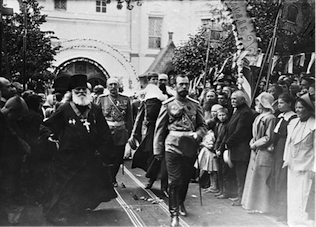

|
Imperial Russia - the Failure of Reform  Tsar Nicholas II during the Romanov Tercentenary, 1913 Russia remained a relatively stable society until the final decades of the nineteenth century. The Tsarist Empire was untroubled by the revolutions that shook Europe's other monarchies in 1830 and 1848. Its huge army crushed the Polish uprisings of 1830 and 1863, the main nationalist challenge to the Tsar's Imperial rule, while its police hampered the activities of the small groups of radicals and revolutionaries, who were mostly driven underground. Russia's failure to reform was a constant frustration for the liberal intelligentsia. It turned many into revolutionaries. Western ideas of representative government and civil rights made little headway in the ruling circles of the court, the centre of power until 1917. The tsars ruled their sprawling empire with an ideology rooted in medieval Muscovy. According to his coronation oath, the tsar's sovereignty was absolute, unlimited by laws or parliaments, by bureaucrats or public opinion. His personal rule was guided only by his conscience before God. Conservatives insisted that autocracy was suited to the Russian national character, that a god-like tsar was needed to restrain the anarchic instincts of the people. |
© 2014 Orlando Figes | All Rights Reserved